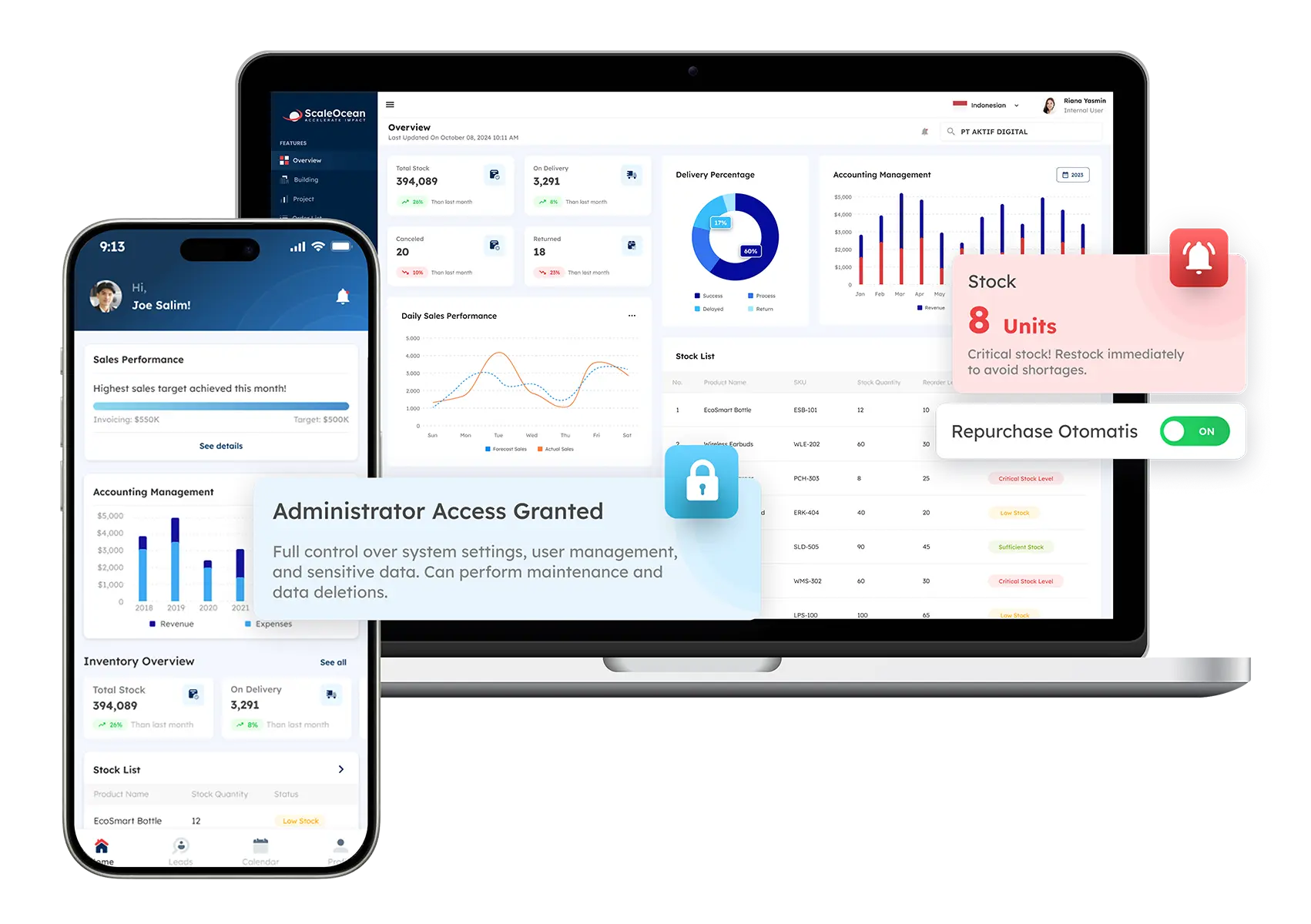Enterprise Resource Planning (ERP) systems are critical for optimizing business processes by combining numerous tasks on a single platform. However, many ERP programs fail to produce the anticipated Return on Investment (ROI), resulting in costly downtime, lost productivity, and reputational damage. These ERP failures are frequently the result of weak planning, a lack of user acceptance, or a misalignment with corporate requirements.
In Singapore’s rapidly changing corporate landscape, digital transformation is a top focus, aided by initiatives such as the Smart Nation program and Enterprise Singapore’s digitalization incentives. Many businesses invest in ERP solutions to increase efficiency, compliance, and growth. However, without a well-executed strategy, ERP system failures can disrupt operations and cause severe financial losses. This article discusses practical ways for avoiding ERP deployment errors and ensuring long-term success.
- ERP failures occur when systems don’t meet goals, causing disruptions or financial losses due to tech issues or poor planning.
- ERP failures are often caused by poor planning, lack of training, resistance to change, and vendor issues, leading to delays and inefficiency.
- Avoid ERP failures by setting clear goals, investing in change management, cleansing data, and choosing the right vendor.
- ScaleOcean ERP ensures smooth deployment with tailored solutions, seamless integration, and strong support to prevent failures.

1. What is an ERP Failure? And Why is It Happening?
An ERP failure happens when the system fails to satisfy company objectives, resulting in operational disruptions or financial losses. This can occur for various reasons, including technological issues, inadequate planning, or insufficient user training. A poor ERP implementation can reduce efficiency, impede decision-making, and result in unexpected costs that strain a company’s financial resources. System problems characterize ERP failure during go-live, failure to integrate with current processes, and large budget overruns.
According to studies, 45% of ERP projects exceed their budgets, while 30% fail. Based on CIO insights from companies like Mission Produce, an ERP failure can lead to significant operational and financial disruptions. Mission Produce faced a $22.2 million drop in gross profit after its ERP rollout caused major issues with inventory management. These data show the problems that firms encounter while deploying ERP systems, as well as the need for strategic planning in avoiding costly failures.
2. Common Causes of ERP Failures
Understanding the underlying causes of ERP deployment problems is critical to prevention. Many failures can be attributed to inadequate planning, misplaced expectations, or resistance to change, all of which can result in high costs. Businesses that identify these risks early might take proactive measures to guarantee a smoother deployment. Key elements include:
a. Poor Planning
Poor planning is actually one of the main causes of ERP project failure. Without clear goals, realistic timelines, and enough resources, the project risks misalignment across departments, causing major delays and inefficiencies. Lack of planning can lead to huge, unexpected costs.
Furthermore, insufficient risk assessment often leads to unforeseen issues. When firms fail to anticipate potential risks, the ERP project can easily be derailed by problems that could have been mitigated early on. A thoughtful plan with realistic expectations and solid risk management is vital for success.
b. Inadequate Change Management
Inadequate change management can seriously hinder employee acceptance and successful ERP adoption. When companies fail to provide enough training and communication, employees often resist the new system, which hurts overall productivity and completely undermines the system’s potential benefits.
Without a robust change management strategy, even the most sophisticated ERP system can fail. Providing clear information, continuous support, and engaged leadership helps employees adapt and embrace the new system, leading to smoother transitions and much better adoption rates.
c. Insufficient Data Cleansing
Data cleansing is vital for guaranteeing a successful ERP implementation. Without proper data prep, migrating inaccurate or outdated data can lead to reporting errors, compliance issues, and inefficient operations. Ultimately, this poor data quality compromises decision-making and system performance.
A lack of data standardization before migration often causes operational bottlenecks and inefficiencies. Businesses should really prioritize data cleansing and validation processes to ensure a smooth data transfer, significantly improving the accuracy and functionality of the ERP system post-deployment.
d. Choosing the Wrong Vendor
Selecting an inappropriate ERP vendor can lead to significant long-term challenges. A vendor lacking experience, features, or scalability may fail to meet your operational needs, resulting in inefficiencies and shockingly high maintenance costs. Thorough research when evaluating vendors is a must.
Choosing the wrong vendor can cause issues with system functionality and support. Companies must assess vendors based on their track record, local expertise, and ability to support future growth and updates. Selecting the right vendor when implementing a hybrid ERP ensures smooth integration and success.
e. Over-Customization
Over-customization in an ERP system can easily lead to unnecessary complexity and long-term issues. While some changes are vital for business needs, excessive customization can bring higher costs, delays, and major compatibility problems with future system upgrades.
Companies should aim to stick to standard ERP features as much as possible. Customizing only when necessary helps strike a perfect balance between meeting business requirements and maintaining system stability, flexibility, and easy future updates.
f. Lack of Executive Support
A successful ERP deployment necessitates strong leadership engagement, yet many projects lack this backing. Without clear direction, resources, or prioritization, teams become mismatched, resulting in inefficiency and resistance.
According to ERP News, 56% of manufacturers are unsure whether their ERP systems are ready for AI integration, highlighting the necessity of senior leadership in driving effective modernization.
g. Inconsistent Budget Allocation
Inconsistent budget allocation is a major reason why ERP projects fail. When funds are underfunded or mismanaged, fluctuating financial support disrupts the project’s stability, leading to delays and overspending. The benefits of the ERP finance module help maintain proper budgeting, ensuring more accurate and stable financial management.
A clear, fixed budget is absolutely crucial for proper resource allocation. By actively monitoring expenses and adapting to unforeseen changes, companies can minimize budget disruptions and maintain better control over costs. This proactive step helps avoid financial strain.
h. Inadequate Testing Before Launch
Insufficient pre-rollout testing often leads to major system errors post-implementation. This lack of thorough checking results in unforeseen bugs, crashes, and unhappy users. Without rigorous testing beforehand, these issues can severely impact your critical operational workflows.
Comprehensive testing across areas like data migration, integration, and user experience ensures smooth functionality. Implementing a phased rollout and user feedback loop can prevent disruptions and enhance system performance. An ERP consolidation strategy helps streamline this process for better results.
i. Excessive Leadership Overlap in Project Management
When too many leaders are involved in one project, decision-making quickly becomes slow and inefficient. Overlapping leadership responsibilities cause confusion, misalignment, and communication breakdowns, which seriously hinder your project’s progress and waste valuable time.
It is essential to establish clear leadership roles and responsibilities right from the start for efficient project management. This ensures decisions are made promptly, accountability is clear, and the project remains easily on track, leading to smoother execution and better outcomes.
j. Poor Communication Across Teams
Effective communication is the key to ERP success. Many projects fail when teams don’t communicate well, leading to misunderstandings, unclear goals, and poor collaboration. This results in costly delays, huge inefficiencies, and misaligned expectations during deployment.
Better communication, clear goals, and regular updates across all teams are vital to ensure alignment. This fosters smoother integration and better utilization of the new ERP system. Using cloud-based ERP software can enhance communication and collaboration, maximizing the system’s benefits and reducing failure risk.
3. Consequences of ERP Failures
An unsuccessful ERP implementation can have far-reaching consequences for a corporation, going beyond financial losses. When an ERP system fails to perform as planned, it can interrupt everyday operations, harm a company’s brand, and frustrate employees. These implications not only affect short-term performance, but they can also impede long-term growth and competitiveness. The following are some of the most serious outcomes of ERP failures:
a. Financial Losses
ERP failures frequently cause large financial losses due to unplanned expenditures, inefficiencies, and lost income. When an ERP system fails, firms may have to devote more resources to debugging, reimplementation, or even transferring to a different provider.
One famous example is Hershey’s ERP failure in 1999, which resulted in a 19% decline in quarterly revenue and a significant disruption in the company’s supply chain. Such financial losses might take years to recover from, affecting investor trust.
b. Operational Disruptions
A malfunctioning ERP system can lead to extensive operational inefficiencies in fundamental corporate processes like production, inventory management, sales, and customer support.
System breakdowns and integration problems can interrupt operations, delaying shipments, lowering order fulfillment rates, and increasing downtime. In industries where timely production and delivery are crucial, such delays can result in dissatisfied consumers and missed economic opportunities.
c. Damaged Reputation
A company’s reputation is founded on trust, dependability, and consistent service delivery. When ERP problems result in service delays, incorrect orders, or data breaches, customers and business partners may lose faith in the organization. Understanding the SaaS ERP meaning is key to preventing these issues and ensuring smooth operations.
Negative publicity and poor customer experiences can push customers to competitors, making it harder for a company to regain market share. In Singapore’s highly competitive business environment, keeping a great reputation is critical for long-term success.
d. Employee Frustration
ERP failures also have an internal impact, causing employee unhappiness as they rely on the system to do their everyday activities. A badly implemented system can result in inefficiencies, higher workloads, confusion, and unhappiness, lowering employee morale.
Over time, firms may see increasing turnover rates as skilled individuals depart for companies with stronger operating systems. Without sufficient user training and support, even a well-designed ERP system can become a source of irritation rather than an efficient tool.

4. How to Avoid ERP Failures: Best Practices
Preventing ERP failures requires a proactive approach, ensuring careful planning and implementation. Businesses must align their ERP strategy with goals, invest in employee readiness, and collaborate with the right partners. Choosing between custom ERP vs. off-the-shelf ERP is crucial for long-term success. The following are critical tactics to achieve a seamless ERP adoption:
a. Set Clear Goals and Expectations
Setting clear, measurable goals is essential for guiding the entire ERP implementation process. These goals must align with your long-term objectives and address key improvement areas, like cutting inventory costs or speeding up order processing. Without them, the ERP risks misalignment.
Having clear expectations helps everyone understand the ERP system’s purpose, benefits, and timeline. Setting realistic goals allows for better progress monitoring and necessary adjustments. Choosing top enterprise software solutions ensures the system aligns with these objectives for success.
b. Invest in Change Management
Change management is crucial for ERP success, as employee resistance is often why these systems fail. Effective change management involves comprehensive training, ongoing support, and regular communication to gently ease employees through the transition.
Employees need to clearly understand how the new system will impact their daily tasks and workflows. When they receive proper training and support, they are far more likely to embrace the system, which reduces resistance and greatly improves the system’s effectiveness.
c. Cleanse Data Before Migration
Data cleansing is a vital, though often overlooked, step before any ERP migration. Ensuring data is accurate, complete, and standardized prevents big issues like reporting errors, inventory discrepancies, and financial inaccuracies. Companies should audit, remove duplicates, and correct errors early.
By cleansing data beforehand, companies can ensure a smooth ERP system implementation, avoiding discrepancies that could disrupt operations later. Clean data fundamentally enhances the system’s overall efficiency, providing accurate insights and truly improving decision-making capabilities post-implementation.
d. Choose the Right Vendor
Choosing the correct ERP provider is crucial to long-term efficiency and scalability. Businesses should select vendors based on industry expertise, customization possibilities, and post-implementation assistance.
Choosing the best ERP software in Singapore involves evaluating factors such as industry-specific needs, scalability, and local support. It’s essential to select a solution that aligns with business goals, offers flexibility for future growth, and ensures smooth integration across departments while minimizing risks and disruptions.
e. Avoid Over-Customization
While ERP systems offer flexibility, excessive customization can complicate implementation, leading to longer timelines, higher costs, and difficulties with future updates. Businesses should focus on core features and minimize unnecessary modifications. A two-tier ERP strategy helps balance customization and efficiency.
By limiting customizations, companies can maintain system stability and easily avoid the complexity of managing a highly tailored solution. This also reduces the risk of incompatibility with future upgrades. A balanced approach ensures the ERP system remains scalable and highly adaptable
f. Secure Executive Buy-In
Gaining executive support is absolutely crucial for the successful implementation of any ERP system. When leadership is actively engaged, it helps ensure necessary resources are allocated and that the project perfectly aligns with the company’s strategic goals. Without their buy-in, success is tough.
Executive involvement also helps communicate the ERP system’s importance to the entire organization. With clear direction and endorsement from top management, employees are far more likely to embrace the system, ensuring the project stays on track and achieves the desired outcomes.
g. Allow Sufficient Time for Setup, Testing, and Transition
Allocating enough time for setting up, testing, and transitioning to your new ERP system is essential for smooth implementation. Rushing through any stage can easily lead to missed errors, poor system integration, and unexpected operational disruptions.
Companies must plan realistic timelines for every phase, including proper testing and training. This allows you to fine-tune the system and address issues well before it goes live. Taking adequate time helps reduce stress, improve system adoption, and ensure a successful transition.
h. Plan for Unexpected Costs During Implementation
ERP implementations often face unexpected costs that exceed the initial budget. These usually come from unforeseen technical issues, scope changes, or the need for extra resources. Budgeting for contingencies is crucial, ensuring your business is fully prepared for any financial surprises.
Without a contingency fund, companies can struggle with unplanned expenses, causing delays or compromises in system quality. By forecasting potential hidden costs, businesses can secure the resources needed. A mobile ERP component can also help streamline processes and mitigate unexpected challenges during implementation.
i. Conduct Thorough Testing Before ERP Launch
Thorough testing is absolutely crucial for catching any ERP issues before going live. This process involves integration testing, user acceptance, and validating data migration to ensure everything works seamlessly. Failing to test properly can, unfortunately, lead to major operational failures.
By testing early and often, businesses can spot bugs, performance issues, and usability concerns, minimizing disruptions. A comprehensive testing phase also ensures employees are comfortable with the system, leading to smoother adoption and higher productivity post-implementation.
j. Ensure Employees Allocate Time for ERP Implementation
ERP implementation needs a serious time investment from your employees, especially during planning, testing, and training. Making sure they can dedicate time to these tasks is essential for a successful transition. Without the right time allocation, the implementation can truly falter.
Employees involved in the process must be given dedicated time to focus solely on the implementation activities. By scheduling ERP tasks and emphasizing the importance of their involvement, companies ensure all team members are aligned and fully equipped to make the system transition successful.
k. Assign a Clear Project Leader for ERP
Having a clear project leader is essential for ERP success. They provide vital direction, ensure deadlines are met, and act as a key liaison between different departments. Without a designated leader, the project can easily suffer from disorganization, confusion, and a lack of accountability.
The project lead oversees all implementation stages, from planning right through to execution. Assigning one person to manage the project streamlines communication, ensures the project stays firmly on track, and lets the business quickly resolve any conflicts that arise during the process.
5. How ScaleOcean ERP Helps Prevent ERP System Failures
Selecting the correct ERP solution is critical for avoiding implementation difficulties, and ScaleOcean ERP stands out as a reliable partner on this road. ScaleOcean provides tailored solutions to satisfy a wide range of company demands, ensuring seamless integration, excellent performance, and smooth transitions.
Businesses that leverage our experience can avoid common ERP errors, reduce downtime, and achieve improved productivity from the outset. Additionally, ScaleOcean offers the CTC Grant, providing financial support for ERP adoption, reducing costs, and boosting capabilities. So, here are the key features for ScaleOcean ERP:
- Pre-built Modules for Quick Deployment: Ready-to-use modules reduce setup time, minimizing disruptions during ERP deployment.
- Scalable Solutions for Businesses of All Sizes: ScaleOcean ERP adapts to your business needs, ensuring long-term scalability as your business grows.
- Compliance with Local Regulations: Complies with regulations like GST and PDPA, helping businesses maintain compliance and avoid penalties.
- Fast and Efficient Implementation Process: Designed for quick deployment, minimizing disruptions during system transition, and speeding up benefits.
- Automated System Monitoring and Maintenance: Real-time monitoring tools ensure system health and performance, preventing potential issues early.
6. Conclusion
ERP system failures can result in considerable financial losses, operational interruptions, and tarnished reputations. Businesses may avoid these issues and achieve effective ERP implementations by preparing ahead of time, setting clear goals, and adhering to best practices. Companies can increase their chances of a seamless and effective transition by identifying potential difficulties early on and aligning the system with business demands.
Partnering with experienced vendors, such as ScaleOcean ERP, can increase your chances of success. ScaleOcean provides tailored ERP systems to match your company’s specific needs. To assist you in making an informed decision, we provide a free demo of our ERP system, allowing you to see how our solution can meet your specific requirements while ensuring flawless deployment.
FAQ:
1. What is the failure rate of ERP?
The failure rate of ERP implementations is estimated to be around 50-75%. Common reasons for failure include poor planning, lack of user training, and resistance to change. These factors can lead to cost overruns, missed deadlines, and ineffective system adoption.
2. Why do 75% of all ERP projects fail?
Approximately 75% of ERP projects fail due to issues such as poor planning, inadequate change management, lack of executive support, and insufficient data cleansing. These factors lead to misalignment, delays, and low user adoption, preventing the system from delivering value.
3. What is the success rate of ERP?
The success rate of ERP implementations varies, with some studies reporting success rates of 30-50%. Factors like proper planning, strong leadership, sufficient training, and clear objectives can increase the likelihood of successful ERP adoption and its long-term benefits.
4. Will ERP be replaced by AI?
While AI will enhance ERP systems by automating tasks and providing advanced analytics, it is unlikely to replace ERP entirely. ERP systems will continue to serve as the backbone for business processes, with AI enhancing decision-making, forecasting, and system efficiency.












 PTE LTD..png)
.png)

.png)








.png)
.png)
















